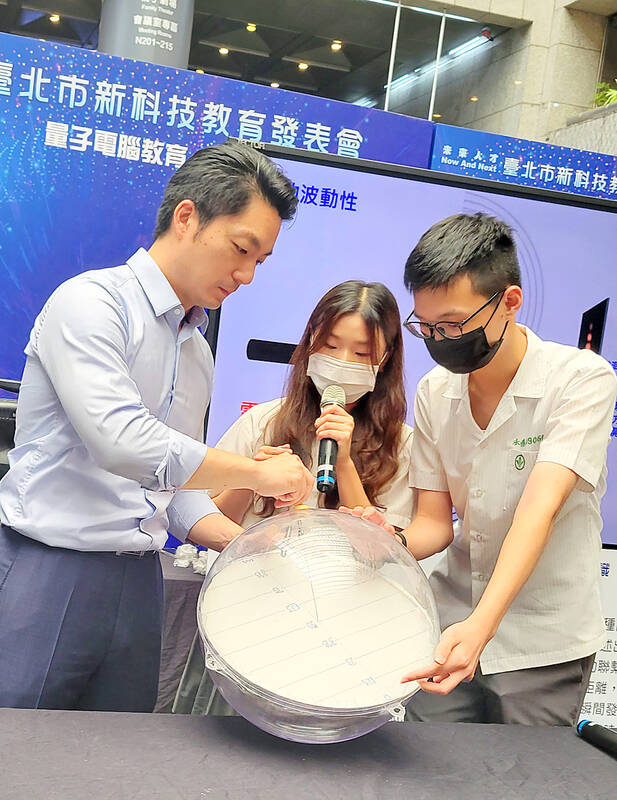The Taipei City Government is implementing an initiative to teach quantum computing in high schools and vocational high schools to provide young people with career training in the technology sector, Taipei Mayor Chiang Wan-an (蔣萬安) said on Friday.
Quantum computers are the product of the latest revolution in computer science and possess immense computational powers that surpass existing supercomputers by multiple orders of magnitude, Chiang said.
The technology would completely change the current approach to applied statistical analysis and algorithm design to accelerate developments in biomedicine, agriculture, transportation and finance, he said.

Photo: Ho Yu-hua, Taipei Times
Education must enable younger generations to adapt to technological change and encourage their participation in the technology industry, Chiang said, adding that the city has created an office for science, engineering, art, mathematics and novel technologies education to reach that goal.
Taipei is the first local government in Taiwan to issue quantum computer science teaching materials to high schools and vocational high schools, a city spokesperson said.
Supplementary teaching materials on quantum computing are to be published on the city’s online education resources, including the Taipei Cooc-Cloud at https://cooc.tp.edu.tw and the Taipei Technology Education Net at https://techpro.tp.edu.tw, they said.
The city also released supplementary materials for classes on generative artificial intelligence (AI) in elementary and junior-high schools, they said.
The portion of the material designated for teachers includes suggestions for lesson plans, classroom activities and learning metrics, while the material for students includes tips on using AI to facilitate learning and research without committing plagiarism, they said.
Taipei Zhongyi Elementary School and Yongchun Senior High School students have presented science projects on quantum entanglement and superposition, the spokesperson said.

Alain Robert, known as the "French Spider-Man," praised Alex Honnold as exceptionally well-prepared after the US climber completed a free solo ascent of Taipei 101 yesterday. Robert said Honnold's ascent of the 508m-tall skyscraper in just more than one-and-a-half hours without using safety ropes or equipment was a remarkable achievement. "This is my life," he said in an interview conducted in French, adding that he liked the feeling of being "on the edge of danger." The 63-year-old Frenchman climbed Taipei 101 using ropes in December 2004, taking about four hours to reach the top. On a one-to-10 scale of difficulty, Robert said Taipei 101

Nipah virus infection is to be officially listed as a category 5 notifiable infectious disease in Taiwan in March, while clinical treatment guidelines are being formulated, the Centers for Disease Control (CDC) said yesterday. With Nipah infections being reported in other countries and considering its relatively high fatality rate, the centers on Jan. 16 announced that it would be listed as a notifiable infectious disease to bolster the nation’s systematic early warning system and increase public awareness, the CDC said. Bangladesh reported four fatal cases last year in separate districts, with three linked to raw date palm sap consumption, CDC Epidemic Intelligence

US climber Alex Honnold left Taiwan this morning a day after completing a free-solo ascent of Taipei 101, a feat that drew cheers from onlookers and gained widespread international attention. Honnold yesterday scaled the 101-story skyscraper without a rope or safety harness. The climb — the highest urban free-solo ascent ever attempted — took just more than 90 minutes and was streamed live on Netflix. It was covered by major international news outlets including CNN, the New York Times, the Guardian and the Wall Street Journal. As Honnold prepared to leave Taiwan today, he attracted a crowd when he and his wife, Sanni,

Taiwanese and US defense groups are collaborating to introduce deployable, semi-autonomous manufacturing systems for drones and components in a boost to the nation’s supply chain resilience. Taiwan’s G-Tech Optroelectronics Corp subsidiary GTOC and the US’ Aerkomm Inc on Friday announced an agreement with fellow US-based Firestorm Lab to adopt the latter’s xCell, a technology featuring 3D printers fitted in 6.1m container units. The systems enable aerial platforms and parts to be produced in high volumes from dispersed nodes capable of rapid redeployment, to minimize the risk of enemy strikes and to meet field requirements, they said. Firestorm chief technology officer Ian Muceus said